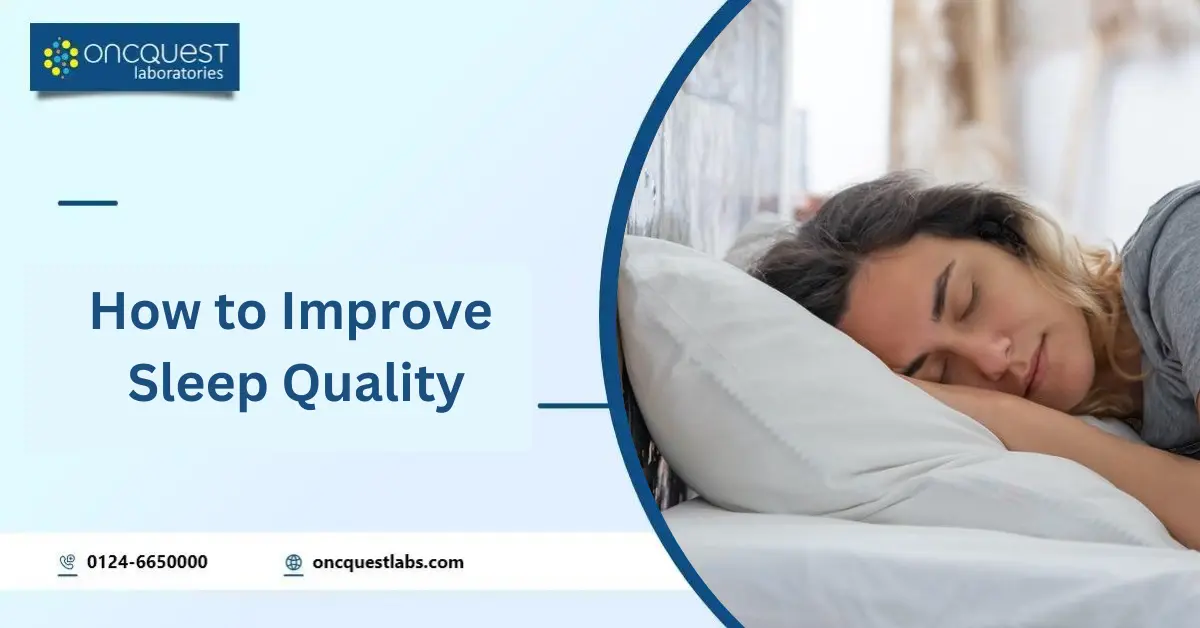Although getting enough quality sleep is crucial for both physical and mental well-being, many people struggle to achieve it consistently. Poor sleep can negatively impact various aspects of life. By focusing on good sleep hygiene, which refers to the habits and practices related to sleep, you can improve your sleep quality significantly.
These steps range from assessing your bedroom environment to fine-tuning your sleep schedule. Our guide aims to help you fall asleep faster, stay asleep longer, and wake up feeling refreshed and rejuvenated.
Enhancing Sleep Quality
By implementing these specific actions, you can create an environment conducive to better sleep, leading to overall improved health and well-being.
1. Invest in Quality Bedding and Mattress: A comfortable mattress and supportive pillows are essential for a good night’s sleep. Opt for bedding that feels soft and helps regulate temperature, ensuring you’re cozy and relaxed.
2. Block Light for Better Sleep: Excessive light exposure can disrupt your sleep patterns. Use blackout curtains or a sleep mask to create a dark, soothing environment that promotes restful sleep. This helps your body produce melatonin, aiding in natural sleep regulation.
3. Minimize Noise Disturbances: Noise can interfere with sleep quality. Use white noise machines, fans, or earplugs to reduce external sounds and create a peaceful sleep environment.
4. Optimal Room Temperature: Maintain a comfortable room temperature between 65 to 68 degrees Fahrenheit for better sleep. Avoid extremes of heat or cold, as they can disrupt your sleep cycle.
5. Prioritize Seven Hours of Sleep: Aim for at least seven hours of quality sleep each night by setting a consistent bedtime that allows for adequate rest. Avoiding caffeine and heavy meals close to bedtime can also improve sleep quality.
6. Stick to a Regular Wake-up Time: Establish a consistent wake-up time, even on weekends, to regulate your body’s internal clock. This helps improve sleep quality and overall energy levels throughout the day.
7. Strategic Napping: Keep daytime naps short (around 20 minutes) and avoid late afternoon naps to prevent interference with nighttime sleep.
8. Pre-Sleep Relaxation Routine: Engage in calming activities like reading, gentle stretching, or relaxation exercises before bed to unwind and prepare your mind and body for sleep.
9. Digital Detox Before Bed: Disconnect from electronic devices at least an hour before bedtime to reduce exposure to stimulating light and promote relaxation.
10. Natural Light Exposure: Spend time outdoors or open curtains during the day to regulate your circadian rhythm. Natural light exposure early in the day supports better sleep patterns.
11. Regular Exercise: Incorporate daily physical activity, but avoid vigorous exercise close to bedtime as it can energize your body and make it harder to fall asleep.
12. Manage Caffeine and Alcohol: Limit caffeine intake after 2 p.m. and avoid alcohol close to bedtime, as they can disrupt sleep quality and lead to restless nights.
13. Healthy Eating Habits: Eat dinner several hours before bed to aid digestion and prevent discomfort during sleep. Opt for lighter evening snacks if needed.
14. Reduce Nicotine Exposure: Nicotine is a stimulant that can interfere with sleep. Minimize nicotine use and exposure to smoke, especially before bedtime.
15. Bedroom Association with Sleep: Reserve your bed for sleep and intimate activities only to strengthen the association between your bed and restfulness.
16. Break the Cycle of Sleeplessness: If you can’t fall asleep within about 20 minutes, get out of bed and engage in relaxing activities until you feel drowsy, then return to bed.
17. Keep a Sleep Diary: Monitor your sleep patterns, habits, and any factors affecting your sleep quality in a sleep diary to identify patterns and make necessary adjustments.
18. Consider Sleep Supplements: Discuss the use of melatonin or other sleep supplements with your doctor if needed, but ensure they are reputable and safe for your health.
19. Consult a Doctor: If you experience persistent sleep difficulties or worsening sleep quality, seek guidance from a healthcare professional. They can assess underlying issues and provide personalized recommendations for improving sleep.
Frequently asked questions
Q1: What is the 10 3 2 1 0 rule for sleep?
A1: The 10-3-2-1-0 rule for sleep emphasizes a gradual winding down process before bedtime: 10 hours before bed, avoid caffeine; 3 hours before bed, avoid large meals and alcohol; 2 hours before bed, limit screen time and stimulating activities; 1 hour before bed, engage in relaxing activities; and 0, aim to be asleep.
Q2: Why is my sleep quality so poor?
A2: Poor sleep quality can result from various factors such as stress, irregular sleep schedule, excessive screen time before bed, caffeine or alcohol consumption close to bedtime, uncomfortable sleep environment, underlying health conditions, or medication side effects.
Q3: How to get deeper sleep?
A3: To achieve deeper sleep, establish a consistent sleep schedule, create a relaxing bedtime routine, optimize your sleep environment (comfortable mattress, cool room, dark and quiet), limit caffeine and screen time before bed, manage stress through relaxation techniques, and prioritize regular exercise for overall sleep quality improvement.
Q4: Is 6 hours of sleep enough?
A4: While 6 hours of sleep may suffice for some individuals, most adults require 7-9 hours of sleep per night for optimal health and well-being. Consistently getting less than the recommended amount can lead to sleep deprivation and various health issues over time.
Q5: Is 5 hours sleep ok for one night?
A5: Getting only 5 hours of sleep for one night is insufficient for most adults and can lead to sleep deprivation, affecting cognitive function, mood, and overall well-being the next day.





